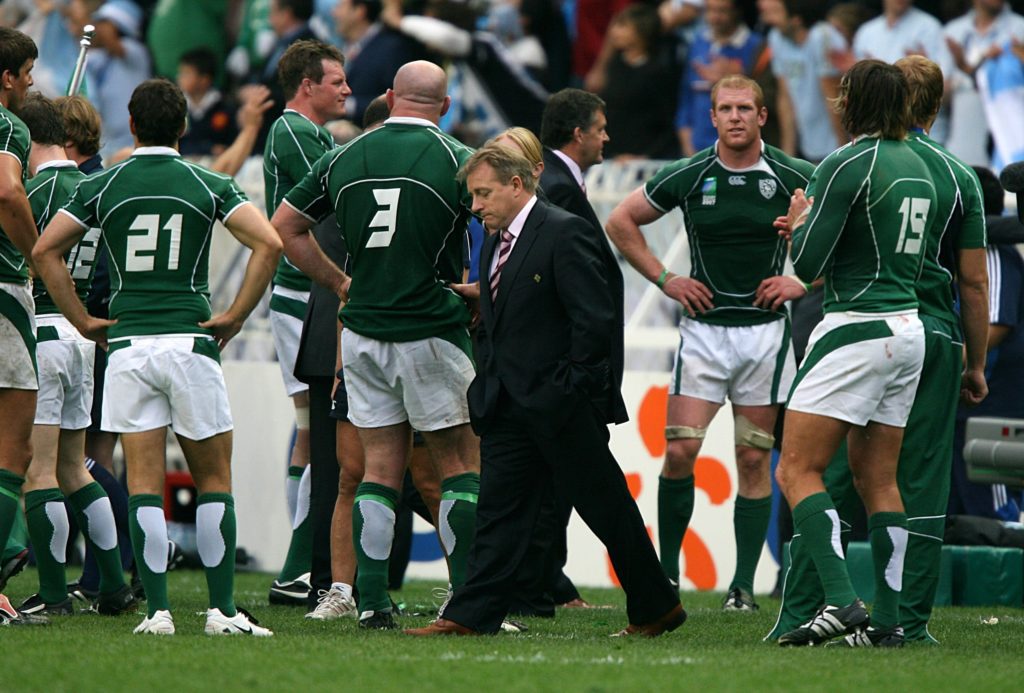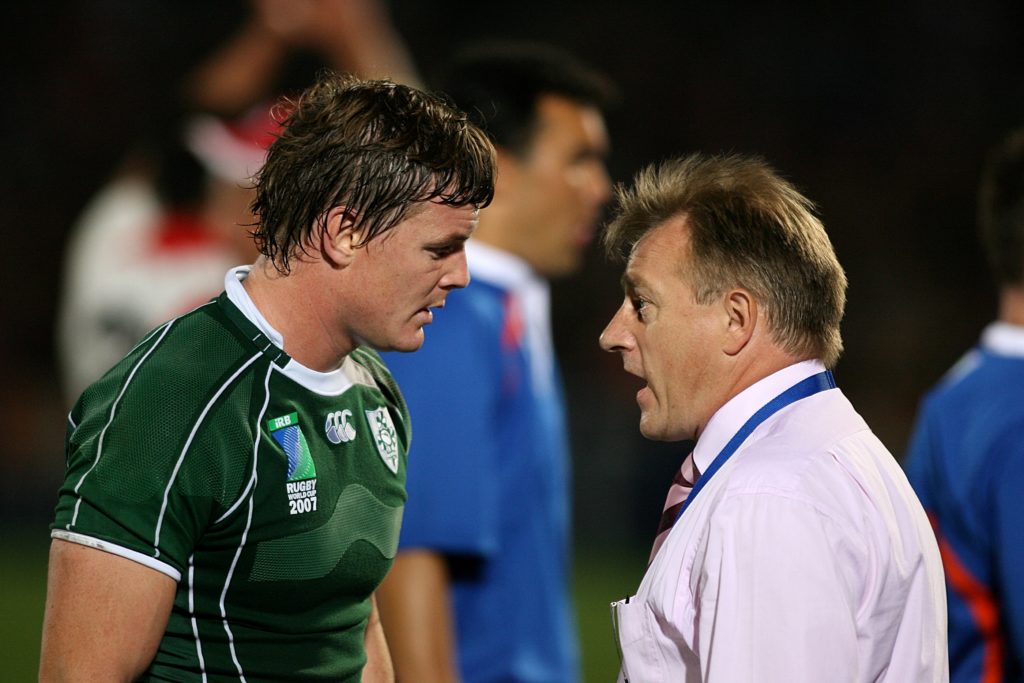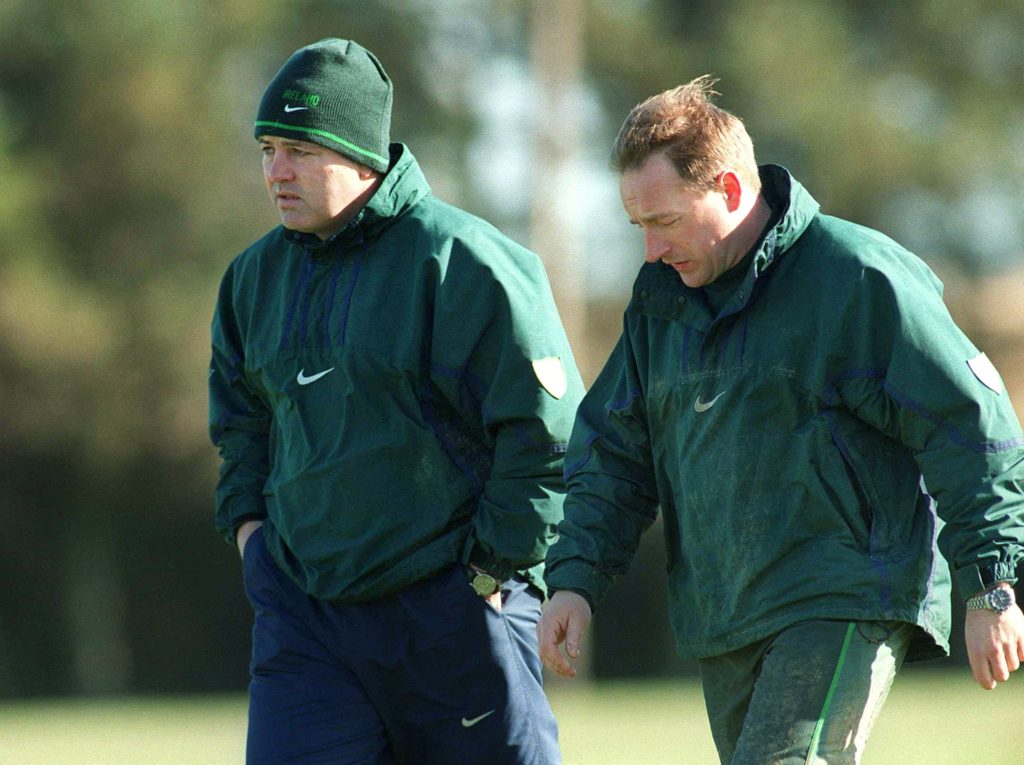Thursday morning, blue skies. Eddie O’Sullivan walks down the cobbled street by Athlone’s left bank, totally unaware of the two men behind him, stopping, staring and pointing in his direction, the taller of the two asking the other, ‘Is that yer man who used to be Ireland coach?’
It was. If this was Hollywood, the rest of the people on this street would come to a halt, the way they do in all the sports movies, before the film would cut to a different scene.
Here we’d see a younger O’Sullivan, 45 years old, standing in the middle of the Adelaide Oval, an hour after Ireland had defeated Argentina in the 2003 World Cup.
This time he is on the phone. Neither Skype nor FaceTime have been discovered yet and the best place to get a mobile signal is in the middle of the pitch. “The stands had emptied by then,” says O’Sullivan. “The players were in the changing rooms, so the halfway line was actually quite quiet.”
He talks to his wife and daughter, before asking if he could have a word with Barry, his nine-year-old. Not possible.
“Sorry, Eddie, but Barry’s in bed with a migraine,” O’Sullivan gets told after the stress of the game made his son fall ill. “Hearing that, it felt like a kick into the guts,” said O’Sullivan said, speaking as a parent rather than a coach.
I made tons of calls home, reminded them that no one was going to die, that people say horrible things but that it doesn’t really matter.
Eddie O’Sullivan on the criticism he received at the 2007 World Cup
It got worse in 2007. By now he was coaching Ireland in his second World Cup, when his sister-in-law took his children away for the weekend, innocently bringing them to a hotel to watch the Ireland-France match.
Halfway through, she whisked them out, after a couple of fans in the hotel bar started abusing the team and their coach. “It was a horrible time,” O’Sullivan said, “to the degree that I don’t like reminiscing about it. I made tons of calls home, reminded them that no one was going to die, that people say horrible things but that it doesn’t really matter. You can’t insulate them from it, though. They’re teenagers. They’ll hear things.”

O’Sullivan is one of only seven men to have coached Ireland in a World Cup, a statistic that surprisingly moves him. “I’ve never thought about it in that way,” he says. “Honestly, it felt just like I was carrying the baton after Warren (Gatland) had his go and up until Declan’s (Kidney) turn came. It’s only when you say it, just seven of us have done it that it gets to you a bit.” He pauses. Five seconds pass, then a sixth, his eyes steering away from his inquisitor. “What’s the word, I’m looking for here? It’s pride. It’s as pure and as simple as that. I’m very proud of that.”
Pride is married to hurt. No other words explain that time in his life more succinctly, this seven-year tale of success, choices and disappointments. He carried Ireland’s dreams and lived with the consequences. Now, in his middle years, he continues to have a swagger in his step and passion in his words but the last place he wants to look is the past.
He’s reminded of breakthrough wins from that period in charge (2001-08), Ireland’s first victory over the Wallabies in 23 years; their first defeat of the Springboks in 39 years; first Triple Crown in 20 seasons; first win at Twickenham in a decade. There were follow-up victories over Australia and South Africa, another pair of Triple Crowns and a hat-trick of wins over England to follow the ’04 breakthrough. “In some ways it’s meaningless,” he says, “because I never framed my time with Ireland around those things. At the time, those wins were just another notch as we sought to get better. Since then, they mean even less. The reality is people remember your failures rather than your triumphs. The ’07 World Cup. Good teams (France and Argentina) beat us; eventual semi-finalists. But you are told you choked.”
History, tragically, has a habit of repeating itself. The easiest thing is to start a war; the hardest thing is to stop it.
O’Sullivan is a keen history buff, studying conflict resolution at Trinity College
Ireland at World Cups always brought out the worst in us. The team routinely flunked, the public increasingly got angry. France, 2007 was a harrowing experience for O’Sullivan but if he’s looking for solace then at least he knows he is in good company. “World Cups aren’t something I like looking back on,” Brian O’Driscoll once said. Few Irishmen do. It’s a scab that never heals.
He has an inquisitive mind. “I’ve always been fascinated by politics,” says O’Suulivan, a reason why he has enrolled on a post-graduate course in mediation and conflict resolution at Trinity College, choosing The Troubles in Northern Ireland as the basis of a recent essay.
Given his background – a cousin of his mother’s fought and was executed in the 1922-23 civil war – you’d half-expect him to side with Irish nationalists in his assessment of those bloodied years. But he doesn’t look at it that way. “It’s not about taking sides. It is about understanding how bad decisions by individuals on an ideological level can have long-lasting ramifications. History, tragically, has a habit of repeating itself. The easiest thing is to start a war; the hardest thing is to stop it,” he says.

For years, he has diplomatically refused to start his own war. After Ireland’s disastrous World Cup in 1999, the IRFU brought him in as Warren Gatland’s assistant. Now bear in mind that Gatland’s CV then was a fairly blank sheet of paper, not one that had Heineken Cup wins, three Grand Slams and two journeys to World Cup semi-finals inked on to it.
Ireland were struggling and O’Sullivan was able to help, vocally championing the cause for players who’d been discarded – Anthony Foley, Mick Galwey, Denis Hickie – and those who’d yet to be given a chance, Ronan O’Gara, Peter Stringer, Shane Horgan, Simon Easterby.
Results turned. Now you have to credit Gatland for this too. He settled on a team and helped them win but after losing to New Zealand in November 2001, the IRFU decided it was time to make a change. The fact they turned to his assistant left a bitter taste, reflected in an interview Gatland gave to Rugby Pass last year, when the Lions coach taunted O’Sullivan by questioning his man-management skills. “When I look back now, there has been only one winner in that debate,” Gatland said in the interview. “When Eddie finished with Ireland, he struggled in jobs and found it difficult to get coaching positions.”
I’d respect him more if he had confronted me. But by speaking about me publicly, when I’m not there to defend myself, it says more about him that it does about me.
Eddie O’Sullivan on Warren Gatland
“The thing I find extraordinary about this,” says O’Sullivan, “is that Warren has said this kind of thing in interviews; he said it on Off The Ball (an Irish sports radio programme) too. We have met and spoken on a couple of occasions since 2001. But everything he has said publicly, he has never said to my face. I’ve lost respect for him for doing that.
“I’d respect him more if he had confronted me. But by speaking about me publicly, when I’m not there to defend myself, it says more about him that it does about me.”

The fickleness of this sporting life never ceases to surprise him. Yet he has always been strong enough to stop disappointments evolving into bitterness, a resilience he links to a childhood growing up in Youghal, a small fishing town east of Cork.
His was an unconventional route to Irish rugby’s top job, a long apprenticeship served in underage coaching and club rugby, then as an assistant coach with the US Eagles, before he was tempted home in 1999. Two years later came his promotion to Ireland head coach. He’d win 64 per cent of his matches – a decade after Ireland’s win ratio hovered below the 30 per cent mark – and win the respect of Ireland’s golden generation. “He was brilliant for us,” said Hickie a couple of years back. “He’s been a loss to the coaching game.” Horgan speaks in similarly glowing terms but so intriguingly does Alan Quinlan, who unlike Hickie and Horgan was not a regular starter under O’Sullivan. “He was always fair, always honest,” said Quinlan. “We respected that.”
When it ended with Ireland in 2008, the US Eagles called. “It was a tough gig, but I knew what I was doing,” he says. “I felt it was important to get out of everyone’s hair in Ireland for a while but I genuinely felt that when I came back from the US (in 2011) enough time had passed (to get back on the coaching rung at provincial level).”
The phone didn’t ring, though. Despite living 45 minutes from the Sportsground, Connacht’s home, they called Kieran Keane, an older man, one living in New Zealand, when a vacancy arose following Pat Lam’s departure in 2017. “After a number of years of not even getting an interview, it dawns on you that it is not going to happen,” he says.
He doesn’t let it get to him. A thoughtful, intelligent man, he kept himself busy by writing a considered and punchy column for The Times. Last year he hosted his own podcast, in between dabbling in club coaching with Old Belvedere. “You self-police as a coach,” he says. “It’s the kind of job you shouldn’t do if you don’t think waking up at 2am to watch a tape of some player or some game is normal.”
I got dog’s abuse for saying as much but it’s my opinion and I’m not afraid of it. If you don’t like it, then don’t listen to it.
Those night-time habits aren’t as plentiful now but he still throws a curious eye over what goes on, generating headlines last autumn when he delivered some harsh, home truths about Scotland, following their defeat BY Ireland. “I probably over-egged the pudding a little with what I said but really, where is the evidence that something special is going to happen with the Scots?” he says.
“I got dog’s abuse for saying as much but it’s my opinion and I’m not afraid of it. If you don’t like it, then don’t listen to it. I don’t like causing controversy but Scotland have a 30 per cent win ratio in the Six Nations over the past two decades.
“They have plenty still to prove. Same with Ireland. Yes, they won six games last year but who did they beat? Italy, Georgia. Come on, what else would you expect? They’d a couple of wins over the Scots, two over Wales. Let’s face it, that was not a good Welsh team as they have aged. For me, the team who stood out last year were Argentina. If they’d have been in the Autumn Nations Cup, they would have won it.”
The Pumas won’t be visible over the next eight weeks but O’Sullivan will be, working as pundit for Irish television. This tournament, this winter festival, has consumed him as a fan, coach and observant since the 1960s, when as a young boy, he remembers sitting in his grandmother’s front room to watch Ireland’s championship decider against the Welsh.
“In those days, there were no programmes scheduled either side of the match,” he says. “There was no lead-in, no group of guys sitting in a studio analysing it. The programme started just when the teams left the tunnel and when the final whistle went, the screen went blank again until the news came on at six o’clock. You’d only four games a year on TV. You savoured every one of them.”
So much has changed since. Yet nothing has. “I’m still absorbed by the game,” he says. “I always will be.”
More Irish stories
If you’ve enjoyed this article, please share it with friends or on social media. We rely solely on new subscribers to fund high-quality journalism and appreciate you sharing this so we can continue to grow, produce more quality content and support our writers.



Comments
Join free and tell us what you really think!
Sign up for free